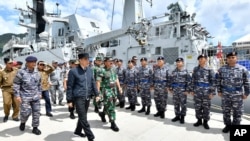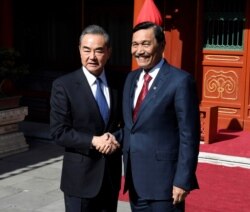Indonesia declined this month to negotiate with China over a tract of sea where Beijing says it should have usage rights.
But Beijing isn't pressuring Jakarta like it does Malaysia, Taiwan, and Vietnam when they offend China’s sovereignty claims.
The populous Southeast Asian archipelago can snub China because of its international clout, and the approach has indirectly helped other countries resist Chinese influence in the 3.5 million-square-kilometer South China Sea that’s prized for natural resources.
Unlike smaller Asian nations, Indonesia with its 273 million people represents a military and political “middle power,” a giant market and a core force in the 10-member Association of Southeast Asian Nations. It is a key country in the Islamic world extending into the Middle East, says Enrico Cau, Southeast Asia specialist with the Taiwan Strategy Research Association.
“Indonesia is not really the type of country you can actually force to coercion as you can do in other cases,” Cau says. “Indonesia is a very different case for a variety of reasons.”
Scholars say that confronting Indonesia’s maritime claims could put tens of billions of dollars in Chinese trade at risk, and in the worst case, spark a backlash against ethnic Chinese people in Indonesia reminiscent of anti-China riots in 1998.
Beijing and Jakarta dispute a swathe of the South China Sea north of Indonesia’s outlying Natuna islands. Indonesia says there is no cause for dispute because its claim follows international maritime law.
China is keeping quiet, as Indonesia bolsters military defenses near the contested waters. After a 2016 incident when an Indonesian navy corvette fired warning shots at Chinese fishing fleet, the Southeast Asian country upgraded a Natuna air base to let two types of fighters and attack helicopters operate nearby. Indonesia is expanding on its own and “growing really fast,” Cau says.
To sit down for talks would imply China has rights to the tract of sea and give it more leverage in the wider dispute involving other countries, said Evan Laksmana, senior researcher for the Centre for Strategic and International Studies think-tank in Jakarta.
“It’s about the potential legality of China’s claim overall,” Laksmana said. “If we implicitly or inadvertently acknowledge China’s rights, either we haphazardly negotiate or have talks or even give China rights to fish and all that, then it would strengthen their overall claim against the other claimants in the area.”
Brunei, Malaysia, the Philippines, Taiwan and Vietnam claim all or parts of the sea. China, which has Asia's strongest armed forces, has alarmed other parties to the dispute since 2010 by landfilling tiny islets for military use.
In recent months, China has sent survey ships and coast guard vessels in waters it disputes with Malaysia and Vietnam. It also flew eight military planes along the edge of Taiwan’s air defense zone this month through June 24.
Indonesia should expect to find more Chinese vessels near the Natuna islands, scholars say. China needs the fish because catches are thinning closer to its own coasts, said Carl Thayer, Southeast Asia-specialized emeritus professor at the University of New South Wales in Australia. China is drilling for undersea fossil fuel in some parts of the sea as well.
“China and Vietnam have polluted their coast and coastal waterways, traditional fishing grounds (and) overfished, so the most lucrative fishing is in the south.” Thayer said.
Indonesia would keep pushing back with its navy coast guard and lodge diplomatic protests, Laksmana said. China is unlikely to raise its game, he said.
Indonesia found about 60 "trespassing" Chinese vessels in 30 locations within its maritime exclusive economic zone in December, the research platform East Asia Forum says. More Chinese vessels came a month later and media reports from Jakarta said Chinese coast guard vessels had escorted some.
Indonesia protested to the Chinese ambassador then and sent warships plus F-16 fighter jets to patrol the region.
The United Nations is the latest forum for the two sides’ claims. The Chinese government told U.N. Secretary-General António Guterres in a letter this month that China and Indonesia have overlapping claims in parts of the South China Sea. China normally cites historical documents to back its claims.
China was responding to a note from the Indonesian government to the U.N. head on May 26. Jakarta had rejected Beijing’s nine-dash line that it uses to demarcate South China Sea claims.





